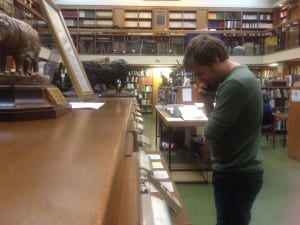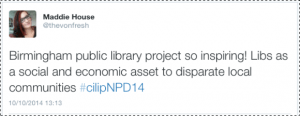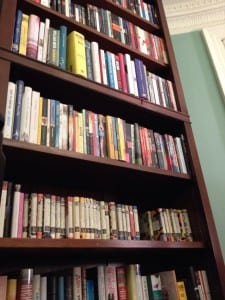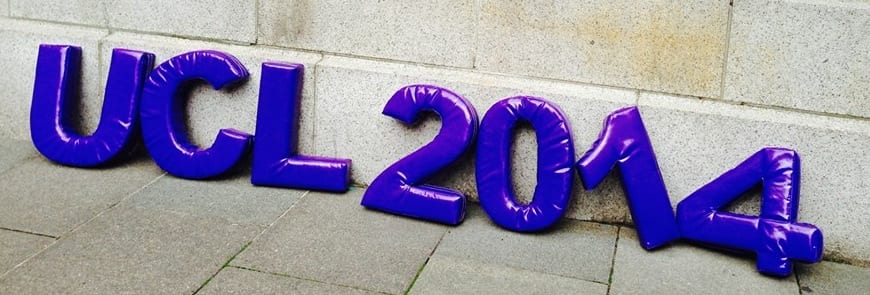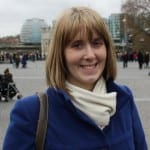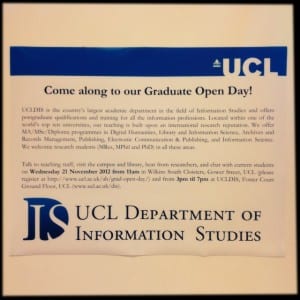
Lambeth Palace by Tavian Hunter
Editorial Note: We are grateful to Lambeth Palace Library for hosting this visit and also for allowing its Collections Librarian, Dr Naomi Percival, to attend our Open Day next Wednesday and share a placement host’s view of the work placement process that forms such an important part of the MA LIS – Anne Welsh, Programme Director MA Library and Information Studies.
—–
After talks and activities ranging from “what to expect from the dissertation process” to “design a poster about the Information Multiverse”, the LIS Induction Week was rounded off with a choice of visits to libraries. I went to Lambeth Palace Library, home to the records of the Church of England and one of the oldest public libraries in the country. It certainly looks much more impressive than your average public library; we entered via Morton’s Tower, a Tudor gatehouse. The Houses of Parliament are visible across the road, and we could hear Big Ben striking. Our visit, however, happened during a period of building work, so we may not have seen it in its full glory. The main part of the library is usually housed in the palace’s great hall (a former feasting hall dating from the seventeenth century), but when we arrived the books had all been moved out, leaving only the bookcases that lined the walls. The cork tiles on the floor are going to be taken up, under-floor heating installed, and a new stone floor laid. This is mainly for the benefit of the books – the draughty hall and the proximity to the Thames mean mould and damp can be a problem – but will hopefully make it more bearable for the people as well.
Our hosts, Naomi Percival and Hugh Cahill, told us about the history of the library and its current function. Originally conceived as a “theological arsenal” – a collection of writings to help refute the religious arguments of opponents – its collections now focus on the history of the Church of England. This covers a very wide range of material: one item we were shown was a geometry textbook written by a polymath Archbishop. This diversity of material means the library’s users aren’t solely the researchers of Church History one might expect, but also people researching local and family history. A lot of users are studying the book as object, so the library also has a large collection of books on bibliographic subjects. When new acquisitions are catalogued, information on provenance is included in the record due to this interest among readers.

Photo by Tavian Hunter
Around five to ten readers use the reading room each day, a figure that has not decreased despite the recent growth of online resources made available by the library. Most of the outreach work done by the library is online, due to the security issues of holding events at the Palace. These include the library’s blog, twitter (@lampallib)and facebook, and online exhibitions. The hall has been used as an exhibition space and hosted several popular exhibitions in recent years, such as the 2011 King James Bible Exhibition.
The archives are the fastest-growing part of the library. One current issue is how to handle the growing volume of material that is in digital form from the outset, such as emails, and how these should be integrated with the archive’s systems. There is also the question of how much should be kept – should a copy of every email be retained? What about the Church of England’s twitter feed? For this reason, the library is selective about donations, and reserves the right to weed collections or refuse parts. Archival donations are often archives of people or organisations connected to the church. It helps the library if money can be donated along with the material to cover the cost of processing it, which can be a very large task.
At the end of our visit, we were shown rare and interesting items from the library’s collections: a book that had been in the great hall when two bombs came through the roof in 1941 (the cover and edges of the pages charred and flaking, but the text inside still legible), Bibles and Books of Common Prayer in languages from all around the world, and a beautiful, Nuremberg Chronicle, one of the books stolen from the library in the 1970s and returned in 2011. We were shown where the identifying marks had been scraped off to hide the book’s provenance.
It was a great visit to a fascinating library, and Hugh and Naomi were very welcoming: we even got goody bags! An excellent way to kick off the year, and I look forward to whatever comes next.
—–
Verity Parkinson is currently studying for her MA Library and Information Studies.
Images: Tavian Hunter (@rubytavian), also studying for her MA LIS this year.
Note: the appearance of the byline on this post is auto-generated, indicating that it was posted by Anne Welsh. Apart from the editorial note, Verity Parkinson is the sole author of this piece, with the images provided by Tavian Hunter.
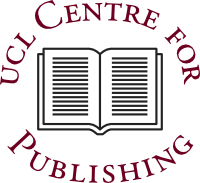 Hi everybody! We are hoping to keep you up to date about events in the publishing world and big events happening in our programme. It’s not definitive but it is more than enough to fill your calendar…
Hi everybody! We are hoping to keep you up to date about events in the publishing world and big events happening in our programme. It’s not definitive but it is more than enough to fill your calendar… Close
Close


